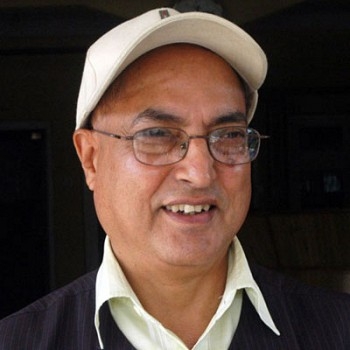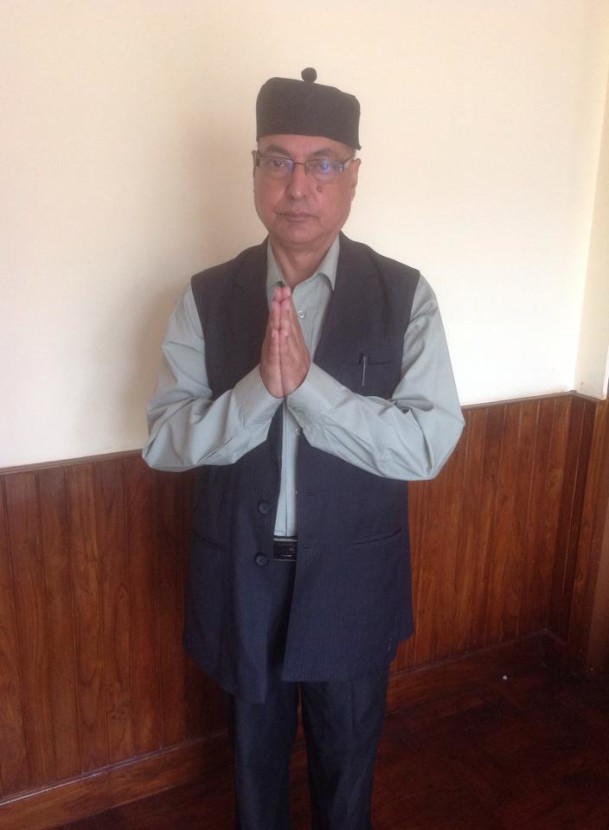We need to have new brains and leadership to address and lead people of the new era: Pradip Nepal
 Pradip Nepal is a renowned name in the field of politics and literature. He has been involved in both fields for more than four and a half decades and succeeded in both. He is very popular for his straightforward views. However, it is said that he has not got the position he rightly deserves in the party as he refuses to be involved in groupism – when other senior party leaders have created separate groups and leaders and cadres are divided in such groups. Nepalekhabar caught up with Mr. Nepal and put forward some questions about the current political situation of the country which was answered in his own style. Here are the excerpts:
Pradip Nepal is a renowned name in the field of politics and literature. He has been involved in both fields for more than four and a half decades and succeeded in both. He is very popular for his straightforward views. However, it is said that he has not got the position he rightly deserves in the party as he refuses to be involved in groupism – when other senior party leaders have created separate groups and leaders and cadres are divided in such groups. Nepalekhabar caught up with Mr. Nepal and put forward some questions about the current political situation of the country which was answered in his own style. Here are the excerpts:
You have been involved in the Leftist movement for quite a while. How do you feel when the country recently installed the 7th Communist Prime Minister?
I don’t feel that the country got the 7th Communist Prime Minister as I don’t believe that you will be communist by just using a communist name/party. I don’t feel he (Pushpa Kamal Dahal) is a communist Prime Minister by putting the name of the party as CPN (Maoist Centre) as the rule of the communist party should be directed towards a welfare state, which is not the case. While analyzing the tenure of different Prime Ministers, I consider only Manmohan Adhikari and K P Sharma Oli as communist Prime Ministers.
Two communist parties were in the government earlier while now one communist party is in the government and another in the opposition. Being a communist leader, how do you evaluate the situation?
These are two big parties but their ideologies are directed towards two opposite poles as their policies, theories and programmes do not match. This is not my conclusion as I want to prove it from the conclusion of Karl Marx. Karl Marx had written many essays while preparing the Manifesto of the Communist Party in 1847 and described about different communist parties at that time. As a result Marx has set certain qualifications for being a communist like: “We are different from those communists who want to violate personal freedom of an individual, those who want to convert the world as a big godown or a barrack in the name of maintaining discipline. We have some communists who want to restrict personal freedom as they feel personal freedom is against the society. However we are very clear in one fact that we could not promote communal harmony in absence of personal freedom. There should be democratic state mechanism, where all political parties get opportunity to prove themselves as best based on their policies and ideologies and get the chance to win majority.” While looking from this context, CPN-UML is following the communist ideology and CPM (Maoist-Centre) is following the ideology of godown.
The tendency of communist parties of Nepal is that they agree to compromise for the sake of reaching power? How do you see it?
This is the big weakness of the political parties. This is the result of the power-mongering nature of political parties.
Do you think ‘foreign powers’ are a decisive force for all political changes in Nepal as we hear the issue of foreign interference during such changes? As you have also become minister at different times, what is your experience about it?
I don’t consider the facts which are not proved as true. We have been hearing that there is an influence of Delhi (Indian Government) in changing governments in Nepal. I am not sure about other governments, but I have some facts that show that the erstwhile government of K.P. Oli was changed in the interest of Delhi. I want to present some facts about why India wanted to change our government. The first thing is about our Constitution. Our constitution is better than the constitution of India and the Indian side couldn’t digest the people oriented constitution. The Indian government sent its representatives to stop issuance of our constitution. All the leaders accepted Indian pressure but UML chairperson K.P. Sharma Oli didn’t pay heed to it and as a result the Indian government became very angry. The blockade was the result of Indian anger. The second thing is that Oli opted for the path of dignity and self-esteem. Delhi could not tolerate the self-esteem of its neighbours, which is the common problem all South Asian countries face. The third thing is that Oli decided to maintain equal distance and relations with its neighbours (India and China). Due to these reasons, Delhi decided to remove the government of Oli and form the government loyal to its interests. The statement of Indian leaders and government officials that with the formation of the new government, Nepal will give the contract of constructing Kathmandu-Nijgad Fast Track to an Indian Company and the relations between India and Nepal will improve proves these facts.
Twenty six governments have changed in Nepal since 1990 against the principal of parliamentary system that the government gets changed every five years. Similarly, the trend to form a government by deciding how many months the government will run and who will be the next prime minister is somehow the norm, so this obviously affects democracy.
This is the unfortunate thing of our country. This is the result of ideological deviation of our leaders (including the leaders of CPN-UML). In the context of Nepal, we need people for forming the government but the government can be toppled by only a few leaders (around 12 leaders). We can only hate the present trend. Although we call our governance system as Federal Democratic Republic, we do not see any sign of Democratic Republic. As a result, I am terming it as a syndicate of 12 leaders.
 Why do you think the leaders became so short sighted and irresponsible towards the people? What should be done to end the current practice?
Why do you think the leaders became so short sighted and irresponsible towards the people? What should be done to end the current practice?
This is a transitional period and all the leaders who are in power at the moment, are the leaders who came from the anti-Panchayat movement. Although we rapidly changed the political system, we could not change the mind-set and awareness level of leaders, cadres and general public. All leaders are guided by feudal mind-set – as a result they discard referendum and they don’t want to make local bodies like villages and municipalities powerful.
Your own party CPN-UML also experienced split and the trend of communist parties splitting into different groups continued. Although all splinter groups cite ideological differences to justify the split, it seems that all are guided by vested interests, so why do you think such situation is repeating?
I have answered this question while answering previous questions. The main reason of split of parties is lack of democratic culture in political parties. Ideology cannot be the basis for split of any political party; it is only the personal ego of party leaders. People’s Multiparty Democracy was the main goal of CPN-UML in 2054 when the party splinted and the splinter group also has the same goal. There are many egos including personal ego in feudal mind-set of leaders which are responsible for split of political parties. CPN-UML faced split due to ego of party leaders like Bamdev Gautam and Madhav Kumar Nepal. Other parties are also facing split due to similar reasons.
You have been known as a selfless leader in the CPN-UML. However these days you do not seem very active – are you side-lined for straight-forward views or you put yourself aside towards giving space to youth leaders?
I am trustworthy person. I consider groupism as an indication of slavery system. I hate groupism to the utmost extent, so, it is natural that I am alone among the crowed of leaders. However, I am enjoying this loneliness. I have been doing what is assigned to me and have no greed for additional power. I have been advocating and encouraging youth leaders to take the leadership role since last four to five years.
CPN-UML is being criticized for not having clear vision, how do you see the future of CPN-UML?
UML does not have clear vision and I have already explained why. Currently, there is no improvement in the situation. I do not see UML being progressive until and unless there is leadership change of comrades who fought against the Panchyat system. We need to have new brain and new leadership to address and lead the people of the new era.
Do you think you are established more as a litterateur than a leader?
I don’t think so. Politics is my moral responsibility, while literature is my life. I was firm in my belief while I was a leader or a Minister and I am committed on the same belief and will also continue on the same belief in the future as well.
Do you have any message to the readers?
I encourage all to read more. I am confident that the future of the country will move towards the path of People’s Multiparty Democracy outlined by Madan Bhandari. The conclusion is the same, so, I encourage all to read the creations of Madan Bhandari.
(Editor’s Note: How do you find this interview? Please send your comments to editor@nepalekhabar.com or editor.nepalekhabar@gmail.com)
